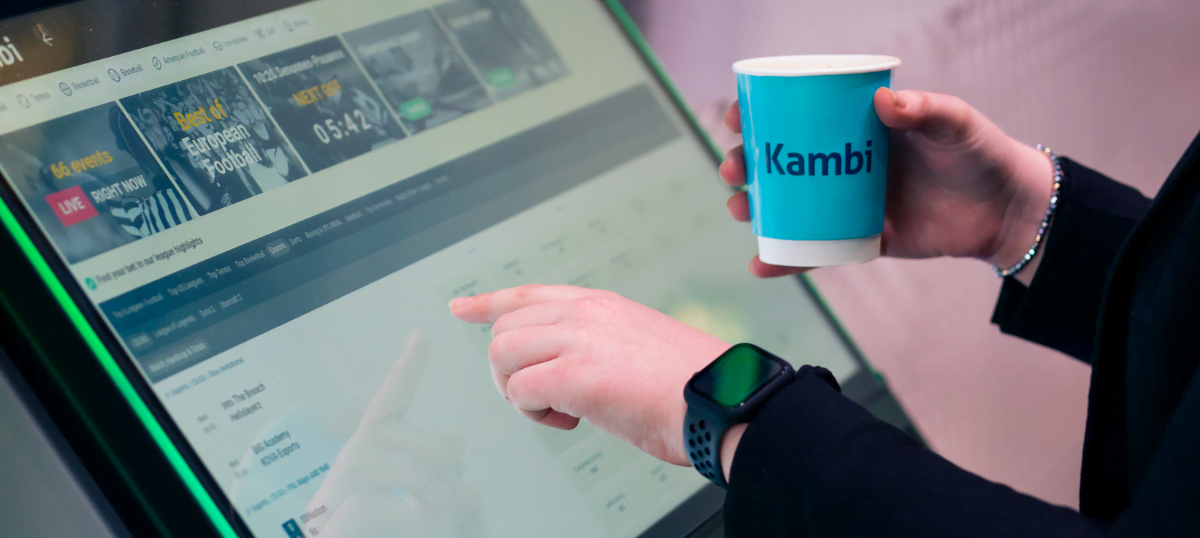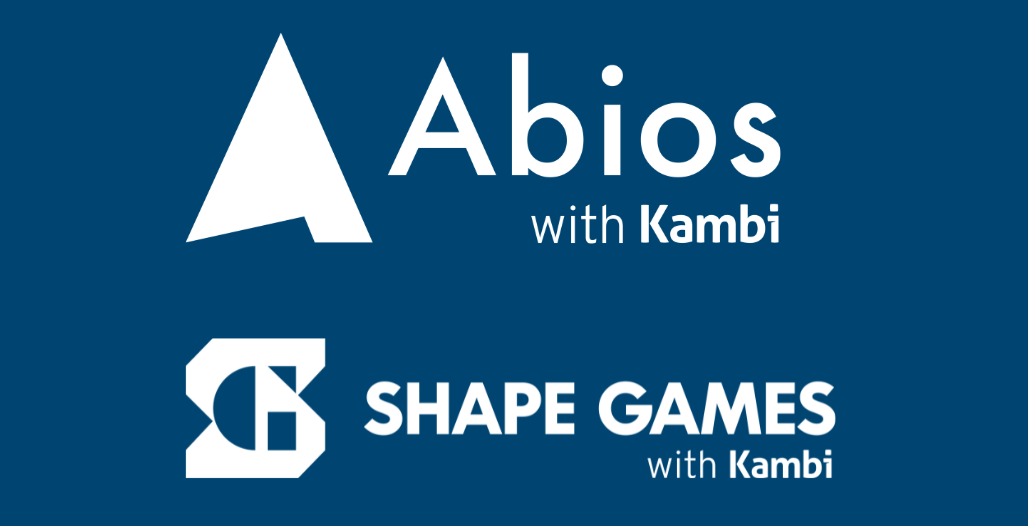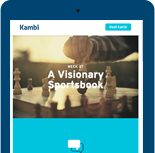
As the sports betting sector continues to evolve, Kambi CEO Kristian Nylén sits down to discuss how the sports betting supplier is evolving its product strategy to lead the industry into a new era.
SBC: Kambi recently unveiled its long-term strategy to investors and analysts at its Capital Markets Day. What were the key products and messages of the day
Kristian Nylén: A key takeaway from the event was how we are expanding our offering through standalone services and the opening up of the Kambi platform – part of Kambi’s wider product development strategy which will not only increase our addressable market but strengthen our market-leading sportsbook.
We believe most operators in regulated markets will continue to require a high-performance full turnkey solution, and our focus remains on pushing the boundaries of our full sportsbook offer while simultaneously having the flexibility to provide standalone elements for those looking to raise the standard of their own sportsbook. This will include products such as Kambi’s award-winning Bet Builder, as well as individual pricing and trading services across different sports.

With ICE coming up in the next few weeks, we look forward to showcasing these modular services to the wider market and also to exhibiting with our recent acquisitions. Abios, leaders in the field of esports content, odds and data, and Shape Games, the industry’s foremost provider of fully-native front-end technology, will also be present on the Kambi stand, both having recently been brought into the Kambi Group.
SBC: During Kambi’s Capital Markets Day you also presented ‘algorithmic trading’ for the first time – can you expand on what this means for your sportsbook?
KN: In simple terms, algorithmic trading means the pricing and changing of odds without human intervention. The growth in computing power, the richness and depth of available data and the strength of Kambi’s algorithms and modelling have enabled us to bring to the market the next generation of trading capability. Trading with algorithms – true automation – enables us to greatly expand the number of available bet offers, fuel the creation of new products and the breadth of the combinability we are able to offer through the Kambi sportsbook.
To this point, a great deal of sportsbook product creation has been guided by a trading department’s ability to price and risk manage certain bet offers. The full automation of algorithmic trading removes these limitations.

End user behaviour is increasingly moving towards the kind of products that only complex algorithms and AI are capable of delivering, and it is worth emphasising that this evolution in trading automation through AI and powerful algorithms will be the standard in years to come – operators cannot afford to risk playing catch up. Our combination with the industry’s foremost UX designers Shape Games will allow us to unlock the possibilities that this increasingly limitless offering enables us to explore.
SBC: Why has Kambi decided to sell module services in addition to its full sportsbook?
KN: In the more than 10 years since Kambi was founded, the core sportsbook platform has grown extensively in both the quality and depth of the experiences it can offer our partners’ customers. Flexibility has been a cornerstone of the growth we have powered for our partners, offering the ability to differentiate extensively in both front-end, pricing and customer experience. The demand for our complete service remains as strong as ever, with more than 10 new partners joining the Kambi network over the past 12 months. But as the market evolves, so too must our services.
Moving into modularised services was simply a natural evolution of our operator empowerment strategy, enabling us to elevate elements of operators’ core sportsbook with different standalone betting products. We are always looking to provide our partners with greater flexibility and put simply, to limit these best-in-class individual elements only to our complete service is to limit their potential. Alongside increasing our total addressable market with operators looking to elevate their existing sportsbook, this will also enhance the levels to which Kambi is able to serve our existing partners.
Alongside providing individual modules from the Kambi sportsbook for operators to enhance their platforms and capabilities, we are also opening up our platform to enable operators to plug other content into the Kambi sportsbook. This will greatly enhance the ability of operators on the Kambi platform to bring their own trading to bear – for example, taking control of trading a particular sport to leverage existing in-house expertise.
SBC: How will this approach impact Kambi’s turnkey sportsbook?
KN: Our complete sportsbook will continue to be our core service as the majority of operators in regulated markets worldwide will still require a full-service end-to-end platform. Continuing to ensure that our complete solution leads the market is integral to our product and wider company strategy.
What expanding our offering into modularised services will enable us to achieve is the development of new and exciting products at greater speed and with even more efficiency. Serving the needs of operators looking to achieve meaningful elevations to their existing sportsbook will reinforce the scalability, focus and innovation of the entire Kambi business.
The increase in the scale of our total addressable market and enhanced potential for revenue generation that comes with the modularisation of our service will also enable us to invest more resources into ensuring every aspect of our service is as strong as it can possibly be.

SBC: What will make Kambi’s standalone modules unique in such a competitive market?
KN: The core factor setting these modules apart from products offered by our competitors is that they exist as part of the core Kambi sportsbook, with the full quality, security and regulatory compliance that brings. We believe this gives Kambi a competitive edge over other B2B sports betting suppliers – which for the most part do not have the full sportsbook view. The result is that the modules are proven to perform as part of a sportsbook framework, benefitting from the wider, more complete view of how they perform and intersect with other elements of the sportsbook.
When partners launch products with Kambi, they do not do so from a standing start. They do so with the full benefit of our years of operational experience and vast depth of network data to draw from. The tight integration with the core product significantly strengthens the data and support afforded to these modules, while at the same time offering partners the independence required to fully leverage those benefits to deliver products their players will desire.
SBC: What is your take on the ongoing debate around insourcing and outsourcing in sports betting?
KN: The conversation as to whether an operator is better served by insourcing or outsourcing its sportsbook is almost as old as the industry itself, with interest in the topic certainly renewed by the growth of sports betting in the US.
I would say that for any operator, it is never as straightforward as taking a ‘one or the other’ approach to going in-house or outsourcing this function.
Framing the debate in this manner fails to accurately reflect the reality of the modern sports betting landscape. There isn’t an operator active today which handles all sportsbook operations internally, with all employing outsourced services to some degree – be that incorporating third-party pricing feeds or making use of an external bet builder, for example.
The real question is not whether an operator should outsource or in-house, but to what extent should an operator outsource the components of its sportsbook, such as platform, odds compiling, risk management, the sportsbook front end or player account management platform, to offer some examples. The extent of this outsourcing will come down to the strategy of each individual company, but there are none which operate today with a 100% reliance on proprietary technology.
My view is that in time we’ll see a shift towards greater outsourcing as the industry matures. The vast majority of mature tech industries see leading companies outsource vast swathes of their supply, and we see no reason that sports betting should be any different over the long term. We may even see this shift accelerate during the current economic crisis as operators seek out high-quality yet efficient third-party alternatives.
SBC: Finally, what role will M&A play in the company’s strategy moving forward?
KN: Bringing Abios and Shape Games into the Kambi Group over the course of the last 18 months exemplifies Kambi’s approach to M&A. Our ultimate aim is ensuring our partners have access to the most comprehensive and high-performance range of solutions in sports betting, and should a particular company be able to help us fulfil that aim, then of course we would consider an acquisition at the right price.

On Abios and Shape Games specifically, with the esports opportunity displaying considerable growth potential, and excellent fully-native front-end technology set to become an ever more crucial point of differentiation for sportsbooks, these acquisitions significantly bolster the combined potential of all three businesses while also strengthening Kambi’s capabilities in two key areas.
Previously appeared on SBC News










